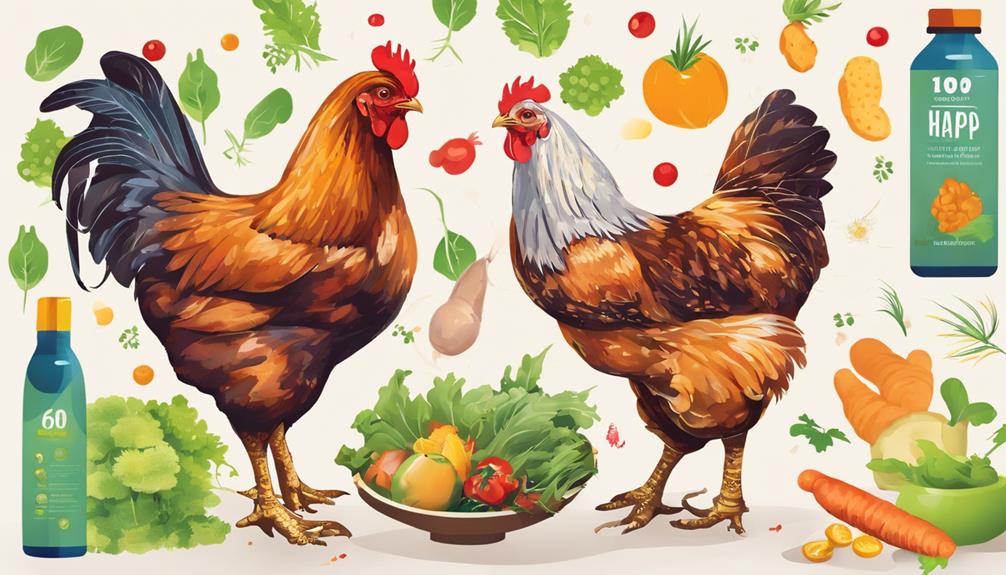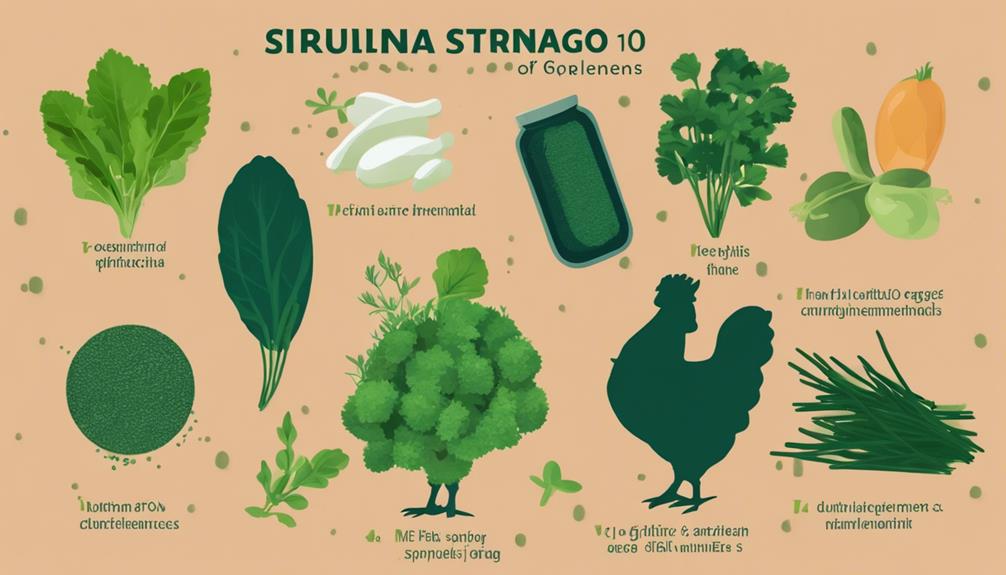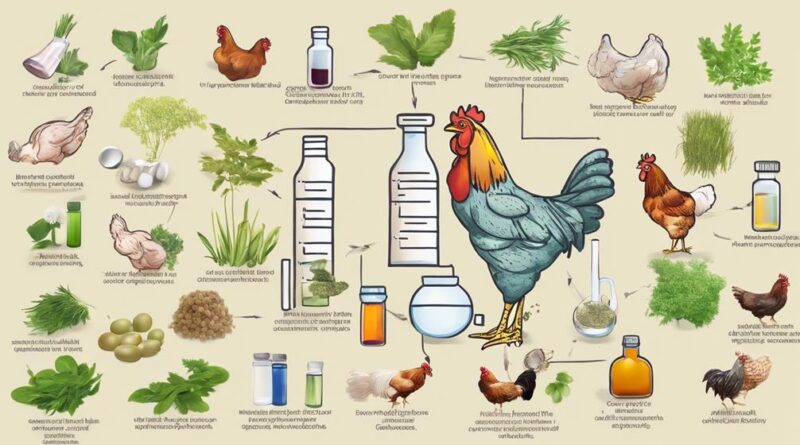Top 10 Organic Solutions for Chicken Diseases"
If you're looking to enhance the well-being of your feathered flock naturally, exploring top organic solutions for chicken diseases can be a game-changer. From herbal tonics that bolster immunity to plant-based remedies that tackle common ailments, the path to a healthier chicken coop is brimming with possibilities. Discover how these organic interventions can revolutionize your approach to poultry care and pave the way for happier, healthier hens.
Herbal Remedies for Respiratory Infections
When treating respiratory infections in chickens, incorporating herbal remedies can be a natural and effective solution. Herbal tonics and steam therapy are two key methods that can help alleviate respiratory issues in your flock.
Herbal tonics, such as those containing garlic, oregano, and thyme, are known for their antimicrobial and immune-boosting properties. These herbs can help strengthen your chickens' immune systems and combat the underlying causes of respiratory infections. You can easily create herbal tonics by infusing these herbs in water and offering the mixture to your chickens regularly. Not only are these tonics natural, but they can also be cost-effective compared to conventional medications.
In addition to herbal tonics, steam therapy can be a beneficial way to help clear your chickens' respiratory passages. Steam helps to loosen mucus and reduce congestion, making it easier for chickens to breathe. You can create a steam therapy session by placing your chickens in a warm and humid environment, such as a steamy bathroom or a makeshift steam room. Just be cautious not to expose your chickens to extremely hot temperatures, as this can be harmful.
Natural Ways to Combat Parasites
To maintain the health of your chickens, it's important to implement natural methods for combating parasites that can affect your flock's well-being. Parasites such as mites, lice, and worms can be detrimental to the health of your chickens.
Utilizing essential oils for parasites is a natural and effective way to combat these pesky intruders. Essential oils like lavender, peppermint, and tea tree oil have been shown to have insecticidal properties that can help repel and eliminate parasites. You can dilute these essential oils in water and spray the solution in the coop and on the chickens to keep parasites at bay.
Homemade remedies can also be a great way to control parasites in your flock. Using ingredients like garlic, apple cider vinegar, and diatomaceous earth can help create an environment that's inhospitable to parasites. Garlic can be added to your chickens' feed to deter parasites, while apple cider vinegar can be added to their drinking water to improve their overall health and make them less attractive to pests. Diatomaceous earth is a natural pest control technique that can be dusted in the coop and nesting areas to kill parasites on contact.
Organic Solutions for Bumblefoot
Combatting bumblefoot in chickens using organic solutions involves implementing natural remedies to effectively treat and prevent this common bacterial infection. Bumblefoot prevention is crucial in maintaining your flock's foot health.
One of the key organic solutions for bumblefoot is the use of herbal remedies. Herbs like calendula, echinacea, and goldenseal have natural antibacterial properties that can help combat the infection. You can create a herbal foot soak by steeping these herbs in warm water and soaking the affected chicken's feet in the solution.
Additionally, incorporating natural remedies such as turmeric paste can aid in reducing inflammation and promoting healing. Turmeric has potent anti-inflammatory and antibacterial properties that make it a valuable organic treatment for bumblefoot. Gently applying the turmeric paste to the affected area can help alleviate symptoms and accelerate the healing process.
It is essential to maintain a clean and dry living environment for your chickens to prevent bumblefoot. Regularly inspecting their feet for any signs of injury or infection can help catch bumblefoot early on. By incorporating these organic solutions and practices into your chicken care routine, you can effectively manage and prevent bumblefoot, promoting overall foot health in your flock.
Plant-Based Treatments for Egg Binding
In managing bumblefoot using organic solutions, turning to plant-based treatments for egg binding can provide natural remedies to address this common issue in chickens. Egg binding, a condition where a hen has difficulty laying eggs, can be distressing if not promptly addressed. Herbal poultices are an effective way to alleviate the symptoms of egg binding in chickens. These poultices can be made from herbs like calendula, comfrey, and lavender, known for their anti-inflammatory and soothing properties. Applying a warm herbal poultice to the hen's vent area can help relax the muscles and promote egg expulsion.
In addition to herbal poultices, dietary adjustments play a crucial role in managing egg binding in chickens. Ensuring that your chickens have access to a well-balanced diet rich in calcium and essential nutrients can help prevent eggshell abnormalities that may lead to binding. Include sources of calcium such as crushed eggshells or oyster shells in their feed to support strong eggshell formation. Additionally, providing ample fresh water and occasional treats like leafy greens can help keep your chickens hydrated and promote overall reproductive health.
Holistic Approach to Preventing Coccidiosis
Implementing a holistic approach is essential in effectively preventing coccidiosis in chickens, a common and potentially harmful intestinal disease caused by protozoan parasites. To safeguard your flock from this infection, consider incorporating herbal tonics and making dietary adjustments.
Herbal tonics can play a significant role in boosting your chickens' immune systems and overall health, making them less susceptible to coccidiosis. Herbs such as oregano, garlic, and thyme are known for their antiparasitic and immune-boosting properties. These can be administered through their water or added to their feed to provide a natural defense against coccidiosis.
Dietary adjustments are crucial in preventing coccidiosis. Ensure that your chickens have access to a well-balanced diet rich in essential nutrients. Include probiotics in their feed to promote healthy gut flora, which can help in preventing coccidiosis. Additionally, consider supplementing their diet with natural sources of vitamins and minerals, such as leafy greens and vegetables. Avoid overcrowding, as stress and unsanitary conditions can increase the likelihood of coccidiosis outbreaks.
Home Remedies for Mites and Lice
To address mites and lice infestations in your chickens, consider incorporating effective home remedies that are safe and natural. Prevention is key when it comes to mites and lice, and essential oils can be a powerful tool in keeping these pests at bay. Essential oils such as lavender, peppermint, and tea tree oil have strong insect-repelling properties.
You can create a DIY spray by diluting a few drops of these essential oils in water and misting your chicken coop regularly. This won't only help prevent mites and lice but also keep your coop smelling fresh.
If your chickens are already dealing with mites and lice, vinegar can be a useful treatment. Vinegar helps to dissolve the exoskeleton of these pests, making it easier to get rid of them. You can create a solution of equal parts water and vinegar and use it as a spray on your chickens.
Make sure to pay special attention to the vent and under the wings where mites and lice often hide. Additionally, adding some apple cider vinegar to your chickens' drinking water can also help deter these pests from infesting your flock.
Using Probiotics for Gut Health

For optimal gut health in your chickens, consider incorporating probiotics into their diet to support their digestive system. Probiotics are beneficial bacteria that can help maintain a healthy balance in the microbiome of your poultry, promoting overall gut health and poultry wellness.
Probiotics offer a range of benefits for chickens. They help in balancing the microbiome in the gut, which is crucial for proper digestion and nutrient absorption. By ensuring a diverse and healthy population of bacteria in the gut, probiotics can aid in preventing digestive issues and maintaining overall well-being in your flock.
Maintaining gut health in chickens is essential for their overall health and performance. A balanced microbiome can enhance immune function, improve nutrient utilization, and reduce the risk of gastrointestinal infections. By incorporating probiotics into your chickens' diet, you can help them maintain a robust and resilient digestive system.
To ensure the effectiveness of probiotics, it's essential to choose high-quality products specifically formulated for poultry. By following recommended dosages and administration guidelines, you can maximize the benefits of probiotics for your chickens. Remember, a healthy gut leads to healthier and happier chickens.
Herbal Teas for Stress Relief
Consider incorporating herbal teas into your chickens' routine to provide stress relief and promote overall well-being in your flock. Stress management is crucial for maintaining your chickens' health and productivity. Herbal teas offer a natural and effective way to help your feathered friends relax and unwind.
Herbal teas are known for their calming properties, making them an excellent choice for herbal relaxation in chickens. Chamomile tea is particularly beneficial for reducing stress and anxiety in chickens. The soothing effects of chamomile can help alleviate tension and promote relaxation in your flock. Lavender tea is another great option known for its calming aroma and stress-relieving properties. Offering your chickens a cup of lavender tea can create a tranquil environment, reducing their stress levels.
To prepare herbal teas for your chickens, simply steep the herbs in hot water and allow the tea to cool before offering it to your flock. Make sure the tea is lukewarm to avoid any burns. You can provide herbal teas to your chickens in their waterers or as a standalone treat. Regularly offering herbal teas to your chickens can help them manage stress effectively and maintain a peaceful coop environment.
Organic Supplements for Vitamin Deficiencies

Explore organic supplements as a solution for addressing vitamin deficiencies in your chickens. When your chickens lack essential vitamins, their health and egg production can suffer. Organic feed is a great foundation for providing necessary nutrients, but sometimes additional support is needed. Natural supplements can bridge the gap and ensure your chickens receive all the vitamins they require for optimal health.
Organic supplements offer a safe and effective way to boost your chickens' vitamin intake naturally. Look for supplements that are specifically formulated to address common vitamin deficiencies in poultry. Vitamin D, for example, is crucial for calcium absorption and overall health. Including a natural supplement rich in Vitamin D can benefit your chickens, especially if they've limited access to sunlight.
Vitamin E is another vital nutrient that plays a key role in immune function and fertility. Organic supplements containing Vitamin E can support your chickens' well-being, particularly during stressful periods or molting seasons. Additionally, Vitamin B12 is essential for energy metabolism and nerve function. By incorporating natural supplements rich in Vitamin B12 into your chickens' diet, you can help prevent deficiencies that may lead to health issues.
Incorporating organic supplements into your chickens' routine can help ensure they receive adequate levels of essential vitamins. By complementing their diet with natural supplements, you can support their overall health and productivity.
Natural Methods to Boost Immunity
Boost your chickens' immunity naturally with proven methods that enhance their overall health and well-being. Immune boosting herbs and organic tonics are excellent options to strengthen your flock's immune system and help them ward off diseases.
One of the most effective immune-boosting herbs for chickens is garlic. Garlic contains allicin, a compound known for its antimicrobial properties that can help chickens fight off infections. You can crush garlic cloves and mix them into your chickens' feed or water to reap its immune-boosting benefits.
Echinacea is another powerful herb that can enhance your chickens' immunity. It stimulates the immune system and can help your chickens stay healthy and disease-free. You can add dried echinacea to your chickens' feed or brew it into a tea for them to drink.
Organic tonics like apple cider vinegar are also beneficial for boosting immunity in chickens. Apple cider vinegar helps maintain the proper pH balance in the digestive system, promoting good gut health and enhancing the immune response. Simply dilute apple cider vinegar in your chickens' drinking water for an easy immune-boosting tonic.
Frequently Asked Questions
Can Organic Solutions for Bumblefoot Be Used Preventatively?
Yes, organic solutions for bumblefoot can indeed be used preventatively. By incorporating natural remedies such as herbal solutions, you can promote overall foot health in chickens, which in turn can help prevent bumblefoot.
Regularly checking and maintaining good hygiene in the coop, providing proper nutrition, and ensuring a clean and dry environment are crucial preventive measures that can contribute to keeping bumblefoot at bay.
Are There Any Herbal Remedies Specifically for Eye Infections in Chickens?
When it comes to herbal remedies for eye infections in chickens, there are a few natural treatments you can consider.
For issues like conjunctivitis, you might want to explore options like using chamomile tea as an eye wash or incorporating calendula petals into a soothing eye salve.
These herbal remedies can help address eye infections in a gentle and organic way, promoting healing and wellness for your chickens.
How Can I Incorporate Probiotics Into My Chicken's Diet Effectively?
To effectively incorporate probiotics into your chicken's diet, consider using probiotic supplements or feed additives. These can promote gut health and provide immune system benefits for your chickens.
Mixing probiotics into their feed or water can ensure they receive the benefits consistently. Be mindful of the dosage and frequency to maximize the positive effects on their overall health.
Can Plant-Based Treatments Help With Sour Crop in Chickens?
Plant-based treatments, such as herbal infusions and natural supplements, can be effective in supporting digestive health and providing alternative treatments for sour crop in chickens.
Herbal remedies, such as chamomile or calendula, can help soothe the digestive system and improve overall gut health.
Natural supplements, like probiotics, can aid in restoring the balance of good bacteria in the gut, potentially alleviating sour crop issues in your chickens.
Are There Any Holistic Approaches for Managing Arthritis in Chickens?
When dealing with arthritis in chickens, you can explore natural supplements and alternative therapies.
Natural supplements like turmeric and fish oil can help reduce inflammation and improve joint health.
Alternative therapies such as acupuncture or physical therapy might also offer relief for your chickens.
It's important to consult with a vet experienced in holistic approaches to develop a personalized plan for managing arthritis in your feathered friends.
Conclusion
In conclusion, utilizing organic solutions for chicken diseases is a holistic approach that can significantly improve the health and well-being of your flock.
By incorporating herbal remedies, natural pest control methods, nutritional support, and immune-boosting supplements, you can effectively prevent and treat common poultry ailments.
Remember to consult with a veterinarian or poultry health expert for personalized advice tailored to your specific flock's needs.
Prioritizing natural and organic solutions can lead to healthier, happier chickens in the long run.
